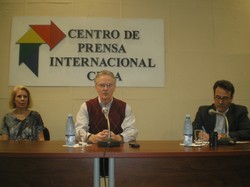The National Council of Churches in the U.S.A. (NCC) will continue to press for normalization of relations between the U.S. and Cuba, an end to the 53-year-old U.S. embargo of Cuba and release of the “Cuban Five” held in U.S. prisons, NCC General Secretary Michael Kinnamon told a packed press conference here Dec. 2.
Kinnamon, speaking at the conclusion of a week-long visit by 15 U.S. religious leaders ― including General Assembly Stated Clerk Gradye Parsons and Associate Stated Clerk Loyda Aja, a Cuban native ― told the crowd of Cuban and international journalists “we come not as politicians or diplomats but as religious leaders. Our first responsibility is to pray for the leaders of both countries and we will … but our churches represent 50 million Christians, so we believe we have some influence and we’ll use it.”
Everyone the delegation spoke with ― from Cuban President Raul Castro to the head of the U.S. government’s Cuban Interest Section here, John Caulfield ― expressed the desire to end the embargo. “The question,” Kinnamon said, “is how to get there.”
Castro, Kinnamon said, “insisted that everything is on the table. All the Cubans require, he told me, is that talks be held in an atmosphere of mutual respect.” Kinnamon said he and Castro discussed “small steps” that can be taken: cooperation on drug and human trafficking in the Caribbean, coordinated air traffic control (communication about the 50 weekly flights currently operating between the U.S. and Cuba is done by telephone, not electronic tracking), weather monitoring and improved telecommunications.
The chances of even small steps to improve Cuba-U.S. relations “are complicated in an election year,” Kinnamon conceded, “but I am a person of faith so I always live in hope,” adding that “since 1968 the position of the NCC (on normalization) has been strong and consistent, taken out of our faith position of reconciliation.”
The NCC will continue to press for a review of the sentences ― anywhere from 20 years to life ― levied against the Cuban Five, who were convicted of espionage in the U.S. even though they were monitoring the activities of Cuban expatriate counterrevolutionaries plotting against the Cuban government.
Numerous international human rights organizations have branded the sentences ― four of the five have been imprisoned for 13 years; the fifth, Rene Gonzalez, was “freed” this fall to stringent “supervised release” and is not allowed to leave Florida ― unjust. Kinnamon said “they should not have been tried.”
Of more immediate concern to the churches, Kinnamon said, is the ability of family members to visit the imprisoned Cubans, at least two of whom are U.S. citizens. Two of the wives and all of the men’s children have never been allowed to visit them in prison. “We ache with them for this situation that weighs so heavily,” he said.
Kinnamon said he also raised with Castro the situation of American Alan Gross, who has been held in a Cuban prison for more than a year for allegedly smuggling illegal telecommunications equipment onto the island. “[Members of the NCC delegation] met with Alan Gross and talked about his sense of being unjustly accused and about his concern for his family, several members of which are seriously ill, including his daughter with cancer,” Kinnamon said.
“I raised the Alan Gross case with President Castro,” Kinnamon said. “I am not here to pass judgment but I care about him as a person ― the humanitarian issue.”
Kinnamon said that while political and human rights discussions occupied some of the delegation’s time, “the primary purpose of our visit has been to be in communion and conversation with our church partners here in Cuba.” Kinnamon praised the Cuban Council of Churches, saying that “U.S. churches need the Cuban churches in order to feel whole and complete.”
In times of economic transition in Cuba and “economic tensions” in the U.S., “it is the call to the churches of both countries to offer a word of hope in response to the anxiety and fear in both countries.”

